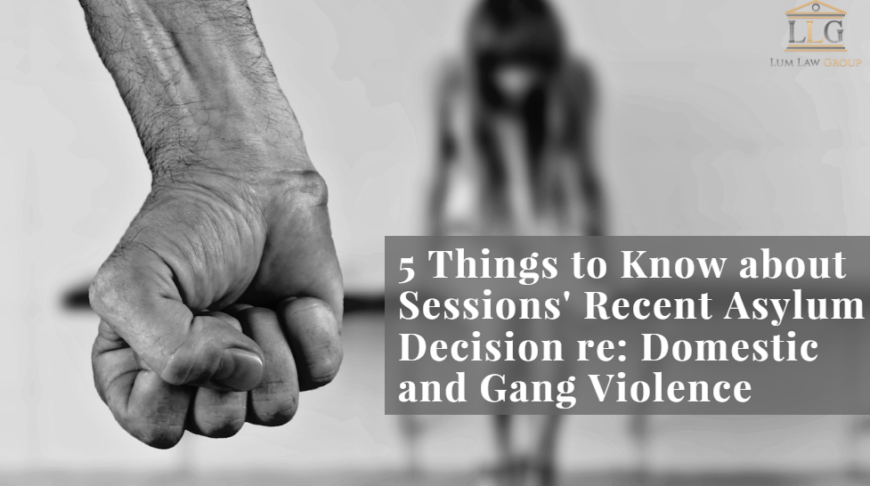5 Things to Know about Sessions’ Recent Asylum Decision re: Domestic and Gang Violence
We have been carefully following Attorney General Jeffrey Sessions’ review of the domestic violence asylum case (Matter of A-R-C-G-, 26 I&N Dec. 338 (BIA 2014)), which he overturned on June 11, 2018. While our previous post on Sessions’ asylum decision was rather detailed, this post will outline the top five things you need to know from his decision.
“Particular Social Group” category definition
Sessions states that persecution is usually government persecution, and while he did not define exactly what the catch-all “particular social group” includes, he does list all the boxes the particular case did not check.
The particular social group must…
- …be widely “understood to be a societal faction or a recognized segment of the population” in the applicant’s home country.
- …have members who share a “common immutable characteristic”, such as one “that either is beyond the power of an individual to change or is so fundamental to individual identity or conscience that it ought not be required to be changed.”
- …not be too wide in definition, such as “married women in Guatemala who are unable to leave their relationship”.
- …not be too narrow in definition, such as “El Salvadoran women who are unable to leave their domestic relationships where they have children in common”.
- …not be helped by the government (when not directly persecuted by the government).
- …must be the primary cause for asylum.
In the case of gang violence, Sessions explains how immigration judges have previously determined that victims of gang violence are not a “particular social group” but come from “all segments of society” and cannot be grouped together. So while it seems that gang members are a social group, victims of gang members are unfortunately not.
Burden of Proof
Sessions highlights that the “burden of proof” lays with the applicant, meaning the applicant must show enough evidence to prove her need for asylum. The evidence must meet all the elements for asylum, which is determined by the asylum officer, immigration judge, or the Board of Immigration Appeals (BIA).
An example of bearing the burden of proof is by proving “group membership”. An applicant is expected to know the origins of the particular social group and be able to describe her membership.
Credibility
Sessions has stated that if an applicant’s asylum claim is “fatally flawed in one respect, [then] immigration officers and judges need not examine the remaining elements of the asylum claim”. This basically means the applicant’s story must add up and be fool proof. If there are any question marks that constitute a “flaw” in reasoning, then the asylum application can be instantly denied without further review.
Applicants may notice the results of this decision at Immigration when observing asylum interviews that last mere minutes.
Government’s Responsibility
To qualify for asylum, the applicant must prove that her government is unable or unwilling to protect her. However, if the government has made efforts but “may have problems effectively policing certain crimes”, then that reason alone is not enough to meet asylum requirements. Similarly, if “certain populations are more likely to be victims of crime”, then it is also not enough to qualify.
In the above case of domestic violence, Sessions states that for the applicant to show that the government doesn’t control private behavior well, e.g., the police don’t respond to 911 calls, is not enough. Rather, the applicant must prove that the government is not only aware of the private behavior, but also allows it to occur. If the case is that the government cannot protect the applicant, then the applicant must show evidence of the government’s inability to protect victims like her.
“The fact that the local police have not acted on a particular report of an individual crime does not necessarily mean that the government is unwilling or unable to control crime, any more than it would in the United States. There may be many reasons why a particular crime is not successfully investigated and prosecuted. Applicants must show not just that the crime has gone unpunished, but that the government is unwilling or unable to prevent it.”
Scope
Finally, Sessions reminds that applicants not only have to prove all of the above and any other requirements, but also has to provide evidence as to why escape to the United States is their only option.
“When the applicant has suffered personal harm at the hands of only a few specific individuals, internal relocation would seem more reasonable than if the applicant were persecuted, broadly, by her country’s government.”
If you have any questions about how Sessions’ decision reversal may affect your application for asylum or immigration hearing, contact us today to talk to an experienced immigration attorney!

